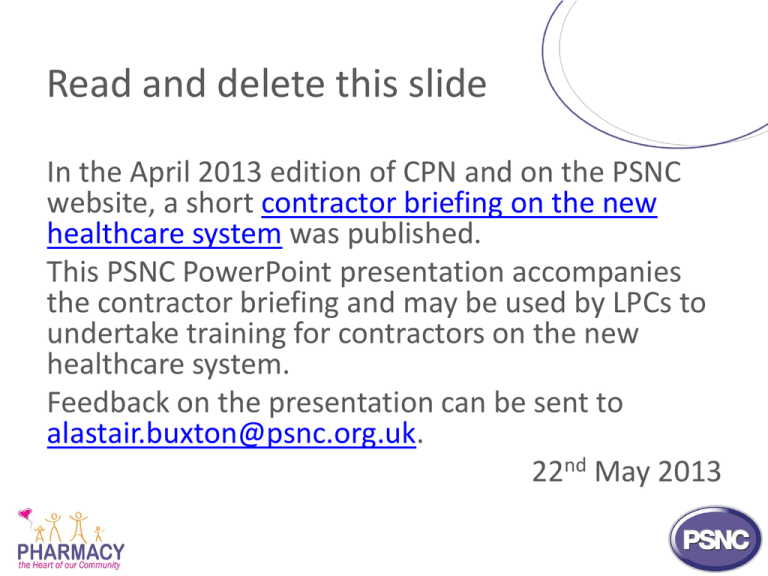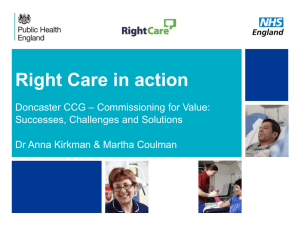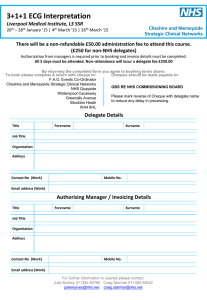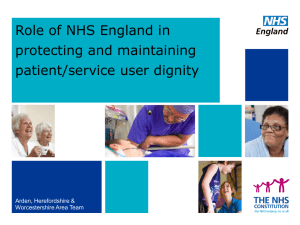An introduction to PSNC
advertisement

Read and delete this slide In the April 2013 edition of CPN and on the PSNC website, a short contractor briefing on the new healthcare system was published. This PSNC PowerPoint presentation accompanies the contractor briefing and may be used by LPCs to undertake training for contractors on the new healthcare system. Feedback on the presentation can be sent to alastair.buxton@psnc.org.uk. 22nd May 2013 Pharmacy’s new commissioners A simplified guide to the new healthcare system Pharmacy and the new system Four levels at which services can be negotiated NHS England national - CPCF NHS England local - Enhanced Local Authorities Clinical Commissioning Groups The Third Pillar – supporting future NHS provision Optimising the use of medicines Supporting people to self-care Supporting people to live healthier lives/public health Supporting people to live independently Community Pharmacy GP led primary care Hospitals Community Pharmacy Contractual Framework (CPCF) • Three players in negotiations – PSNC – NHS England / NHS Employers – Department of Health (DH) • NHS England and DH have specific areas of responsibility DH’s role • Leading the nation’s health and care • Sets legal framework for system, including regulations for pharmacy • Secures funding from HM Treasury • ‘System steward’ • Determines NHS reimbursement price of medicines & appliances PSNC Community Pharmacy Conference - 24 April 2013 NHS England Three distinct, but interconnected roles: 1. A leader and enabler of the overall commissioning system – supporting CCGs to commission services for their communities 2. A direct commissioner – securing continuously improving quality from the services we commission, including primary care 3. A system wide leader for quality improvement – collaborating with other parts of the system, including Public Health England and Health Education England NHS England’s Mandate • High quality care for all, now and for future generations • Success will be measured through the NHS Outcomes Framework: Domain 1 Preventing people from dying prematurely Domain 2 Enhancing quality of life for people with long-term conditions Domain 3 Helping people to recover from episodes of ill health or following injury Domain 4 Ensuring people have a positive experience of care Patient experience Domain 5 Treating and caring for people in a safe environment and protecting them from avoidable harm Safety Effectiveness NHS England • NHS Community Pharmacy Contractual Framework – Commissioning Development Directorate (working with Operations and Medical Directorates) negotiates with PSNC on remuneration for pharmacy contractors and new national service elements within the contract – NHS Employers will undertake some negotiations on behalf of NHS England NHS England - local • 27 Area Teams (AT) which are part of the Operations Directorate • ‘Local’ office of NHS England – Direct commissioning of primary care – Specialist commissioning (e.g. offender health) – ‘Supervision’ of CCGs • Single operating model • Performance management of CPCF • Commissioning of Enhanced services (including on behalf of CCGs and LAs) NHS England - LPNs • Local Professional Networks (LPNs) for pharmacy, optometry and dentistry within each AT • They are intended to provide clinical input into the operation of the AT and local commissioning decisions • They will: – support implementation of national strategy and policy at local level – work with other key stakeholders on the development and delivery of local priorities, some of which go beyond the scope of primary care commissioning – provide local clinical leadership NHS England - LPNs • Pharmacy LPN specific functions include: – supporting local authorities with the development of the Pharmaceutical Needs Assessment (PNA) – considering new programmes of work around self-care and long term conditions management in community pharmacy to achieve Outcome 2 of the NHS Outcomes Framework – working with CCGs and others on medicines optimisation – ‘holding the ring’ on services commissioned locally by local authorities (LAs) and CCGs, highlighting inappropriate gaps or overlaps Local authorities • 152 top tier authorities • Public Health and Social Care Outcomes Frameworks influence their commissioning • Responsible for commissioning the majority of public health services – Using a ring-fenced budget – Can use standard public health service contract • A Health and Wellbeing Board (HWB) for each LA – providing strategic oversight and bringing together all local commissioners Local authorities • LAs and CCGs develop the Joint Strategic Needs Assessment (JSNA), working through the HWB • The JSNA is used to develop a Joint Health and Wellbeing Strategy… • …and informs the development of the Pharmaceutical Needs Assessment • Which is used by the NHS England Area Team to determine some pharmacy market entry decisions Clinical Commissioning Groups (CCGs) • Responsible for commissioning health services (as opposed to public health services) using the standard NHS contract • All GP practices within the area of the CCG are ‘members’ • Early focus on hospital contracts • May wish to commission minor ailment services, palliative care schemes, MUR+ and other medicines optimisation services from community pharmacy NHS Pharmaceutical Services – System Map Department of Health Public Health England Sets legal framework, secures funding Executive agency of the Department of Health NHS Pharmaceutical Services Product reimbursement Services remuneration Division of roles Department of Health NHS England Determines NHS reimbursement price of medicines & appliances Commissions NHS Pharmaceutical Services – including Essential, Advanced & Enhanced services, plus Local Pharmaceutical Services Inform market entry & commissioning decisions Local Authorities Health & Wellbeing Boards (produce pharmaceutical needs assessments) Commission public health services Clinical Commissioning Groups Commission other services Pharmacies Health Education England Dispense medicines & appliances & provide associated & other services Local Education & Training Boards Dispensed prescriptions submitted with claims for other services Health & Social Care Information Centre Collates & provides information NHS Business Services Authority Calculates and makes payment to dispensers. Provides management information Charged for product reimbursement NHS Connecting for Health functions Charged for service remuneration The role of your LPC • Add content on the local work the LPC is undertaking Questions & discussion








